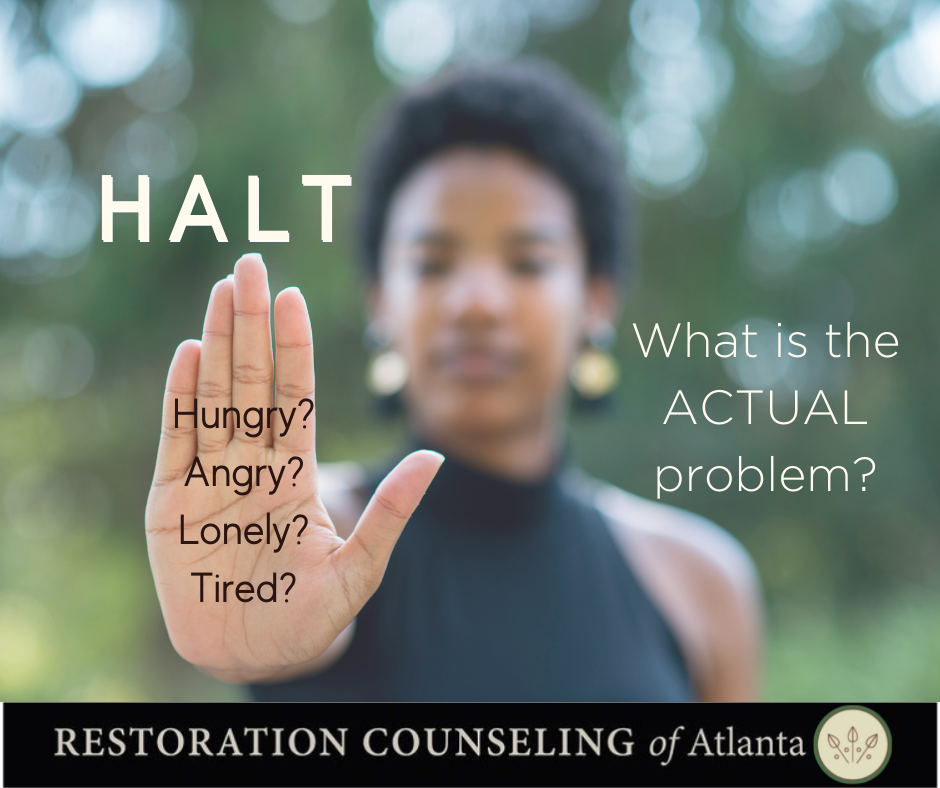In my bio I talk about how “I enjoy helping individuals 18+ notice when their ‘check engine’ lights are coming on. Then we can take a look under the hood before any costly maintenance needs to be done.” Four common examples of those check engine lights coming on are when we feel hungry, angry, lonely, or tired. There is nothing wrong with feeling these four ways; we all feel them probably every day, and often multiple at the same time. When we notice ourselves feeling hungry, angry, lonely, tired, or some combination of those four, it is an opportunity to “HALT.” In other words, that is our signal to pause and have a quick check-in with ourselves.
What is HALT?
The HALT acronym is most often used in addiction recovery groups to identify risk factors for relapse. If an alcoholic feels triggered to drink, the true underlying need might be food or sleep. Perhaps they have skipped some AA meetings and did not notice how lonely and isolated that has made them. Or, after a stressful week at work, there is some anger and resentment towards the boss. HALT-ing helps pinpoint what the actual problem is, instead of immediately going to the typical coping mechanism, in this case alcohol, which does not meet the underlying needs.
In my therapy practice, I don’t often work with addiction, yet many of my clients could benefit from the HALT method of slowing down and having a brief moment of reflection. Although we eat, sleep, and talk to others every day, there is still a good chance that at least one of these four areas might be untended if we aren’t intentional with daily maintenance.
How does it help?
Here are some questions to ask yourself while you HALT.
Hungry: When was the last time I ate? Am I willing and able to take the time to plan ahead to ensure I have snacks and water? Who can I ask to help me get this part of my life more under control?
Angry: Have I let small frustrations build up? Is there anyone I need to address these frustrations with, once I have given myself some space to cool off?
Lonely: Do I feel seen, known, and accepted by those around me, even one person? When was the last time I spent quality time with a friend?
Tired: What is my sleep routine like? How much sleep am I getting? This post from the Sleep Foundation gives several good tips to help assess everything from your habits to what is in your bedroom itself.
As you practice intentionality around these areas, asking yourself these types of questions will become more natural. If it seems too overwhelming to work on hunger, anger, loneliness, and tiredness, pick one area to focus on. A former client wisely called sleep “the first domino,” meaning when that area is out of whack, it often has large repercussions. Perhaps that category is a good place to start, if you’re unsure how to begin.
As always, if something from this article resonates with you, I’d be happy to discuss it further for your specific lifestyle. Please feel free to email me at hannah@restorationcounselingatl.com.

Written by Hannah Clark, APC
hannah@restorationcounselingatl.com, ext. 122
Roswell and Woodstock locations
Hannah offers therapeutic help to people from all walks of life. Her philosophy is that counseling is for everyone. Just like we go to the doctor for check-ups and take our cars to get the oil changed, mental health works the same way. Hannah has experience counseling individuals with issues such as trauma, PTSD, grief, depression, anxiety, career/life transitions, and shame. Hannah also works with married couples on their relationship and communication.

